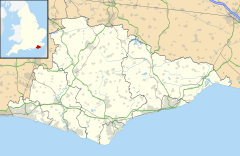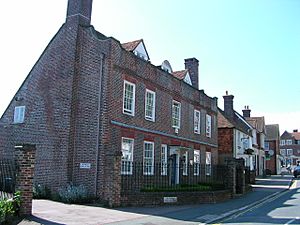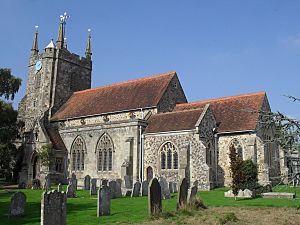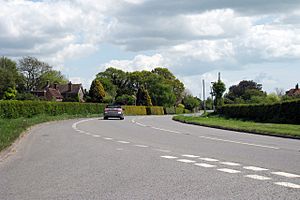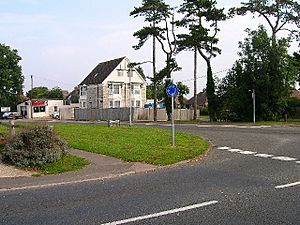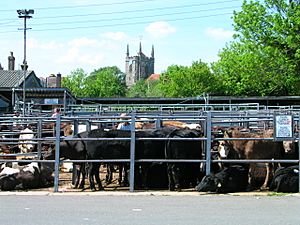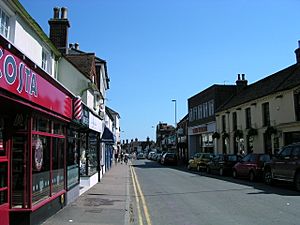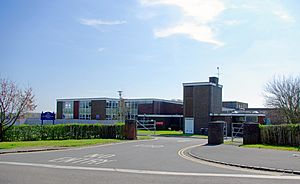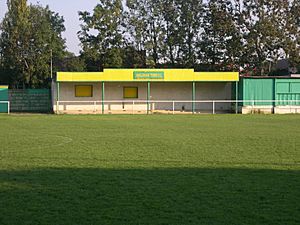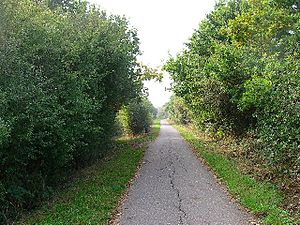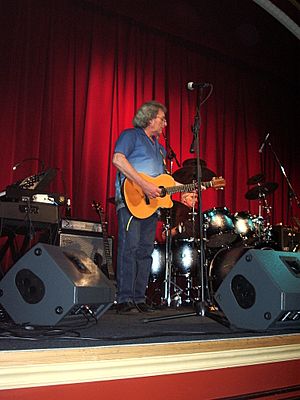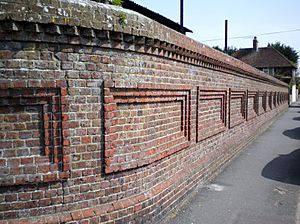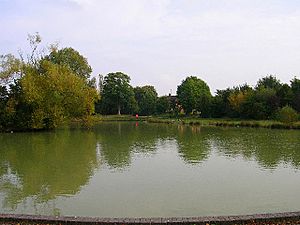Hailsham facts for kids
Quick facts for kids Hailsham |
|
|---|---|
| Town | |
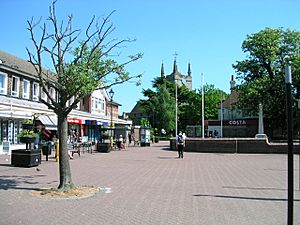 Hailsham town centre |
|
The council's logo |
|
| Area | 19.4 km2 (7.5 sq mi) |
| Population | 23,411 (2021 Census) |
| • Density | 2,652/sq mi (1,024/km2) |
| OS grid reference | TQ589093 |
| • London | 61.4 miles (98.8 km) NNW |
| District |
|
| Shire county | |
| Region | |
| Country | England |
| Sovereign state | United Kingdom |
| Post town | HAILSHAM |
| Postcode district | BN27 |
| Dialling code | 01323 |
| Police | Sussex |
| Fire | East Sussex |
| Ambulance | South East Coast |
| EU Parliament | South East England |
| UK Parliament |
|
| Website | http://www.hailsham-tc.gov.uk/ |
Hailsham is a town in East Sussex, England. It's the main office for the Wealden area. Hailsham is mentioned in the old Domesday Book from 1086. For a long time, it has been known for its farming and factories.
Contents
- What's in a Name?
- A Look Back in Time
- Hailsham's Location and Surroundings
- How Hailsham is Run
- Hailsham's Economy
- Homes and New Buildings
- Learning in Hailsham
- Getting Around Hailsham
- Media and News
- Sports and Fun
- Arts and Entertainment
- The Town Crest
- Interesting Places to See
- Places to Worship
- International Friends
- Famous People from Hailsham
- Images for kids
- See also
What's in a Name?
The name "Hailsham" probably comes from an old Saxon name, "Haegels Ham." This means "Haegel's clearing" or "settlement." Over the years, the town's name has been spelled differently. Some old spellings include "Hamelsham" and "Aylesham."
A Look Back in Time
People have lived in the Hailsham area since the Stone Age. It was a British settlement even before the Romans arrived in 43 AD. Later, the Anglo Saxons came in 477 AD. They took over a fort nearby at Pevensey, which helped them form the kingdom of Sussex.
In Roman and Saxon times, the land near Hailsham was probably a big marsh. This marsh would have been covered by salt water at high tide. You can still see this connection in names like Marshfoot Lane.
The town of Hailsham is mentioned in the Domesday Survey from 1086. This survey was done by the Normans after they conquered England. It showed that Hailsham was a small place with only a few homes back then.
During the 1600s, when England had a civil war, Hailsham supported the Parliament against King Charles I.
Becoming a Market Town
King Henry III gave Hailsham the right to hold a market in 1252. At first, the market was held in the High Street. But in 1868, it moved to its current spot. Farmers used to bring their sheep and cattle from far away. Today, Hailsham still has weekly livestock markets and a monthly farmers' market. There are also regular street markets in the town centre.
Important Moments in History
- 43 AD: Hailsham was an old British settlement before the Romans arrived.
- 1252: King Henry III gave Hailsham its Market Charter.
- 1425-1450: The current St Mary's Church was built.
- 1540-1640: Hailsham became a major centre for leatherwork and tanning. This was because it had a busy cattle market.
- 1803: Barracks were built on Hailsham Common for soldiers fighting France.
- 1849: Hailsham got its own railway station.
- 1974: Hailsham's local council changed its name to Hailsham Town Council.
- 1990: The Cuckoo Trail opened. It's a path for walkers, cyclists, and horse riders on an old railway line.
- 2012: Hailsham Market was saved from being turned into a supermarket.
Hailsham Museum & Heritage Centre
If you want to see what Hailsham was like in the past, visit the Heritage Centre. It has old photos and items that show how people lived. You can see a period kitchen, farming tools, and things from local industries and wartime.
Hailsham's Location and Surroundings
Hailsham is in East Sussex, about 6 miles (10 km) from the coast. It's surrounded by pretty countryside, with hills and the South Downs. Hailsham is the biggest inland town in East Sussex. It has about 8,500 homes and over 20,000 people.
Getting Around Hailsham
Hailsham is 7 miles (11 km) north of Eastbourne and 14 miles (23 km) west of Hastings. London is about 48 miles (77 km) away.
- Roads: The A22 road, which goes from London to Eastbourne, passes through Hailsham. Bus services connect Hailsham to nearby towns like Lewes, Brighton, and Eastbourne.
- Trains: The closest train station is in Polegate. From there, you can catch trains to London, Gatwick Airport, and other major towns.
- Air: The nearest airports are Gatwick Airport and Heathrow Airport.
How Hailsham is Run
Hailsham has three levels of local government that help manage the town's services.
Town Council
At the local level, Hailsham is looked after by the Hailsham Town Council. This council has members elected from different parts of the town. They help make decisions about local services and projects.
District Council
Hailsham is also home to the Wealden District Council. This council has 55 members elected every four years. They handle bigger issues for the whole Wealden area.
County Council
The next level is the East Sussex County Council. They are in charge of things like schools, libraries, and transport for the whole county.
Parliament
Hailsham is part of the Sussex Weald area for the UK Parliament. The current Member of Parliament (MP) for this area is Nus Ghani.
Hailsham's Economy
Hailsham has always been a market town for the farms around it. It also has some light industries.
Businesses and Shops
Hailsham was given the right to hold a market by King Henry III in 1252. For many years, there was a debate about selling the Hailsham Cattle Market land to build a supermarket. But in 2012, the market was saved and bought by its operators.
Hailsham's old industry was rope making. They even made ropes for public hangings in Britain and its colonies! Today, there are smaller factories and businesses in industrial areas. These places provide jobs for local people.
Hailsham has many local and national shops, restaurants, and supermarkets. The main shopping areas are along High Street and George Street. There are several supermarkets like ASDA, Waitrose, and Tesco.
Helping Hailsham Grow
A group called Hailsham Forward was started in 2012. Their goal is to make the town centre better, attract more visitors, and help local businesses. They want to make the High Street more friendly for walkers and improve shops.
Local Markets
- Hailsham Street Market: This market is held every Saturday in Vicarage Field.
- Hailsham Farmers' Market: This market takes place on the second Saturday of each month at the Cattle Market. It sells local produce.
Homes and New Buildings
Hailsham has grown a lot since 1945, with many new homes built. The local council plans for more development in the future. They want to make sure that new roads, schools, and healthcare facilities are built at the same time.
Learning in Hailsham
Primary Schools
Hailsham has several primary schools for younger students. These include Hawkes Farm, Grovelands, Phoenix Academy, Burfield Academy, and White House Academy.
Secondary Schools
The town has one main secondary school, Hailsham Community College. It's known for its sports programs. There's also an independent secondary school called Bede's School.
You might have heard of Hailsham from the novel Never Let Me Go. A fictional school in the book is called Hailsham, but the movie was filmed somewhere else.
Getting Around Hailsham
Road Travel
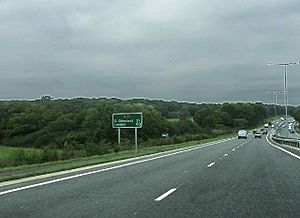
Hailsham is close to two main roads: the A22 road (to Eastbourne) and the A27 South Coast Trunk Road. Bus services connect Hailsham to many nearby towns. There are also special bus links to smaller villages.
Old Railways
Hailsham used to have a train station on the Cuckoo Line. This line ran from Polegate to Tunbridge Wells. The station opened in 1849 but closed in 1968. Now, part of the old railway line is the Cuckoo Trail, a path for walking, cycling, and horse riding.
The closure of the railway was a big deal for the town. Even though Hailsham was growing, the train services stopped. The last train left Hailsham station in September 1968, after 119 years of railway history.
Media and News
Local Publications
Hailsham has local newspapers like the Hailsham Herald and the Sussex Express. There's also a free monthly newspaper called Hailsham News that shares local stories and promotes businesses. The Hailsham Eye is another local publication with lifestyle and community information.
The Hailsham Town Council also publishes a newsletter called 'Our Hailsham' three times a year. It tells residents about the council's activities and upcoming events.
Radio Station
Hailsham has its own online radio station, Hailsham FM. It started broadcasting on 95.9FM in May 2018.
Sports and Fun
Local Sports Teams
- Hailsham Town Football Club: Known as The Stringers (because of the town's rope-making history), they play in a local football league.
- Hailsham Cricket Club: This is one of the oldest cricket clubs in East Sussex, started in 1871. They play at their ground on Western Road.
- Hailsham Hockey Club: This club plays field hockey in the South East Hockey League.
Places to Play and Exercise
- Maurice Thornton Playing Field: This field has space for football, stoolball, and athletics.
- Freedom Leisure Centre: This centre has a gym, a swimming pool with a slide, and 10-pin bowling lanes. There's also an outdoor bowling club.
Outdoor Activities
- Fishing: You can go fishing at the Hailsham Country Park lake during the right season.
- Horse Riding: Many people enjoy horse riding in Hailsham, and there are several stables nearby.
- Walking: There are lots of footpaths, woodlands, and riverside walks in the Hailsham area.
- Cycling: The Cuckoo Trail is a great place for safe cycling. It runs through Hailsham and connects to other towns.
Arts and Entertainment
Hailsham has a brass band called Wealden Brass and a singing group called Hailsham Choral Society.
The town also hosts the annual Hailsham Festival. This event celebrates local talent and creativity.
Another big event is the Guy Fawkes Night celebration in October. Thousands of people come to watch the event, organized by the Hailsham Bonfire Society.
Hailsham Pavilion
The Hailsham Pavilion is a historic cinema and concert hall. It was built in 1921 and first showed the film The Kid starring Charlie Chaplin. It closed as a cinema in 1965 and was later used as a bingo hall. After being empty for a while, it was restored and reopened in 2000.
Live Entertainment
Hailsham Live is a big music and family event that started in 2021. It brings live music and fun to the town.
Summerheath Hall
Summerheath Hall is a community hall. It's home to Hailsham Theatres, a group that performs plays and musicals.
Gallery North
Hailsham has an art gallery called Gallery North. It shows the work of local artists and offers art workshops. The gallery is run by volunteers and relies on donations to keep going.
The Town Crest
The Hailsham Town Crest was designed by a local councillor. It's a shield divided into four parts.
- The top left shows symbols of East Sussex County.
- The top right shows a sheaf of corn, a crook, and a rake. These represent Hailsham's farming history and its status as a market town.
- The bottom right shows a mill, possibly the last one in town, Hamlin's Mill.
- The bottom left shows a ball of twine and a rope "dolly." This represents Hailsham's history of ropemaking, which was an important industry.
Interesting Places to See
Hailsham has many old buildings, mostly Victorian style.
- War Memorial: This memorial in the High Street remembers the 86 men from Hailsham who died in World War I and 35 more who died in the Second World War.
- St Mary's Church: This church dates back to the early 1400s. It has bells from 1663 and 1889.
- The Old Vicarage (The Grange): Built in the early 1700s, this old house was once home to the local vicar.
- Fleur de Lys and Inglenook: These buildings in Market Street were built in 1542. They were once an inn, then a workhouse, and now they are the Hailsham Town Council offices.
- The Grenadier: This building was part of the barracks built in 1803 for soldiers.
- The Old Court House: Built in 1861, this was once the town's police station and court.
- The Stone: This is probably the oldest house in Hailsham, built around 1320. It has old features like inglenook fireplaces.
- Michelham Priory: Located nearby, this old priory was founded in 1229. It's surrounded by a large medieval moat and beautiful gardens.
Parks and Gardens
- Hailsham Country Park: This park covers about 22 acres. It has woodlands, open fields, a wildflower meadow, and two ponds. You can find many types of trees and wildlife here.
- The Common Pond: This pond has been a central part of Hailsham for centuries. It's seen as the town's "Jewel In The Crown." The council bought it in 1922 for public use.
- Dennis King Memorial Orchard & Sensory Garden: Opened in 2010, this garden helps save traditional English orchards. It's also designed to be easy for everyone to visit, including people with sight problems.
Places to Worship
Hailsham has many different churches and places of worship:
- Hailsham Parish Church (Anglican)
- Christchurch Hailsham
- Emmanuel Church (Anglican)
- Hailsham Baptist Church
- St Peter & St Paul's Church
- Hailsham Free Church (Evangelical)
- St Wilfrid's Roman Catholic Church
- Hailsham Methodist Church
- Gordon Road Evangelical Church
- Living Word Community Church (Evangelical)
- Hailsham Gospel Mission
- Primrose Hall Corinthian Church
- Kingdom Hall (Jehovah's Witnesses)
- Bartholemew's Church
International Friends
Hailsham is twinned with Gournay-en-Bray in France. This means the towns have a special friendship. They signed a Twinning Charter in 2000 and often visit each other.
Famous People from Hailsham
- Fanny Cradock (1909–1994): A famous British TV cook.
- Peter Grant (1935–1995): A music manager, known for managing the band Led Zeppelin.
- Lord Hailsham (1907–2001): A British politician.
- Ronnie Hilton (1926–2001): A popular English singer from the 1950s.
- Anne Shelton (1923–1994): A popular English singer from the 1940s and 1950s.
- Thomas Wolsey (1473–1530): A powerful English cardinal. He once owned a property in Hailsham.
Images for kids
See also
 In Spanish: Hailsham para niños
In Spanish: Hailsham para niños
 | Valerie Thomas |
 | Frederick McKinley Jones |
 | George Edward Alcorn Jr. |
 | Thomas Mensah |


